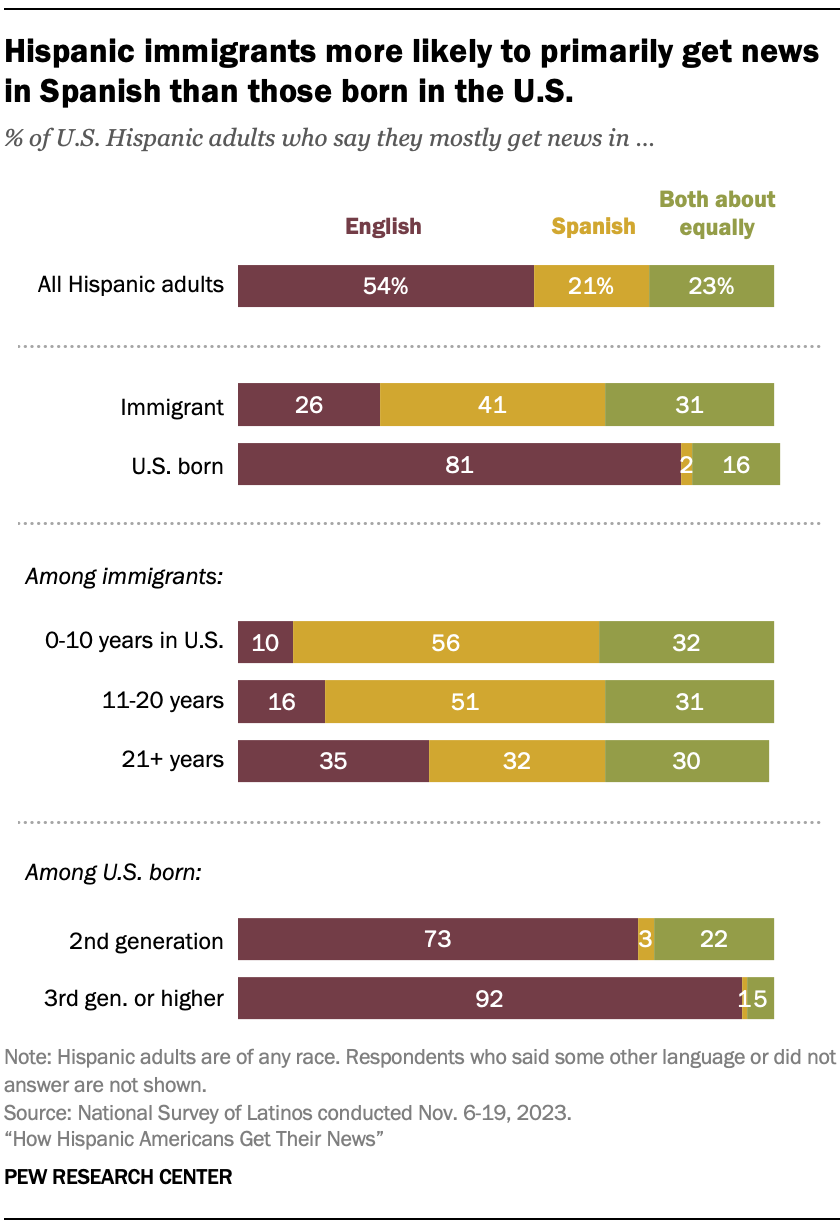☀️ Happy Thursday! The Briefing is your guide to the world of news and information. Sign up here!
In today’s email:
- Featured story: Reddit and YouTube to face lawsuits from Buffalo shooting survivors
- New from Pew Research Center: How Hispanic Americans get their news
- In other news: Google fined in France over dispute with news publishers
- Looking ahead: Supreme Court hears First Amendment case on Biden administration’s communication with social media sites
- Chart of the week: Major difference in news language choice between U.S.-born Latinos and immigrants
🔥 Featured story
A New York state judge has ruled that Reddit and YouTube must face a lawsuit filed by survivors of the 2022 mass shooting in Buffalo, which killed 10 Black people. The lawsuit claims that the sites’ algorithms helped to radicalize the shooter with racist ideas, challenging the limits of Section 230 – a federal law that has generally protected internet platforms from liability for content posted by their users.
About one-in-five Americans (22%) say they use Reddit, including 8% who say they regularly get news on the site, according to a 2023 Center survey.
Meanwhile, 82% of U.S. adults say they use YouTube and 26% report regularly getting news there. And a 2020 survey found that 78% of YouTube news consumers reported watching news videos recommended by the site’s algorithm at least occasionally, while a similar share said these recommendations are at least somewhat good.
🚨 New from Pew Research Center
A new Pew Research Center survey explores how Hispanic Americans get their news, including the languages in which they consume news and their engagement with Hispanic media outlets.
Key findings include:
- Just over half of U.S. Hispanic adults (54%) get their news mostly in English – far higher than the share who get their news mostly in Spanish (21%).
- Half of Hispanic adults at least sometimes get news from Hispanic outlets (i.e., those that specifically cater to Hispanic audiences).
- Attention to news is declining among U.S. Latinos, a trend that mirrors the one found among the general public.
- Most Latino adults prefer digital devices for getting news, far outpacing those who prefer television, radio or print.
📌 In other news
- Google fined in France over dispute with news publishers
- Trump allies’ claims about censorship hinder efforts to combat election disinformation
- Gannett and McClatchy will stop using Associated Press content
- India will start to monitor and fact-check social media posts about government matters
- How high school newspapers are staying away from digital-only models and sticking with a physical paper
- A look at a Minnesota news outlet that serves its local immigrant communities
📅 Looking ahead
The Supreme Court appeared skeptical Monday over a lawsuit seeking to stop the Biden administration from urging social media companies to take down information it sees as false or objectionable. The plaintiffs argued that the administration’s actions, which applied to alleged misinformation about COVID-19 vaccines and election fraud, amounted to unconstitutional coercion under the First Amendment. A ruling is expected by June.
More than half of Americans say both the U.S. government and technology companies should take steps to restrict false information online, according to a 2023 survey. There is more support for tech companies than the government doing this kind of moderation, but the share of U.S. adults who say the federal government should restrict false information has grown from 39% in 2018 to 55% in 2023.
📊 Chart of the week
This week’s chart looks at the languages in which Hispanic Americans consume news.
Most Hispanic adults who were born in the U.S. (81%) say they mainly get news in English, compared with just 26% of Hispanic immigrants. Conversely, Hispanic immigrants are much more likely than U.S.-born Hispanics to get news mainly in Spanish (41% vs. 2%). Hispanic immigrants who have spent more time in the U.S. also are less likely than those who’ve arrived more recently to mostly consume news in Spanish; they’re more inclined to turn to English-language news instead.

👋 That’s all for this week.
The Briefing is compiled by Pew Research Center staff, including Naomi Forman-Katz, Jacob Liedke, Sarah Naseer, Christopher St. Aubin, Luxuan Wang and Emily Tomasik. It is edited by Katerina Eva Matsa, Michael Lipka and Mark Jurkowitz, and copy edited by Rebecca Leppert.
Do you like this newsletter? Email us at journalism@pewresearch.org or fill out this two-question survey to tell us what you think.